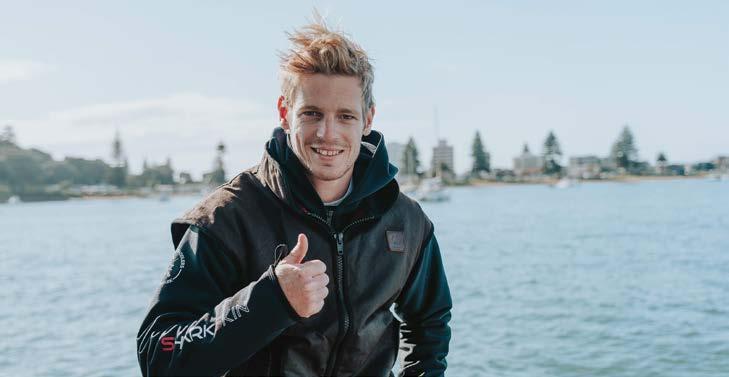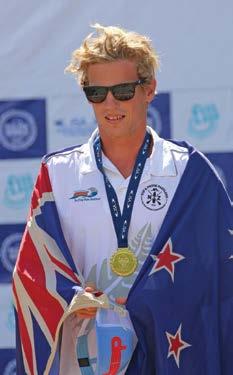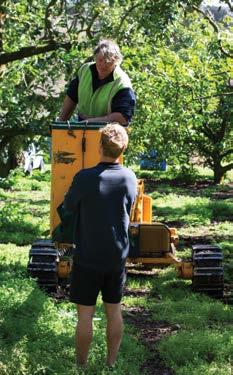
4 minute read
The tale of a young avocado grower
Sam Shergold
YOUNG GROWERS
Sam Shergold is an ocean lover. It’s his self-confessed second home and where he’s been successful in the world of surf lifesaving through Mount Maunganui Life Guard Service. And it taught him how to challenge himself and also, we suspect, self-discipline.
By Heather Woods
With lives in his hands and a passion for life saving sports, he has excelled. He also took on the World Paddle Board Championships – which he won. It was in this exhilarating world that he met his mentor, Tony Bradley, who guided him into a career at Aongatete Avocados. Tony also gave him a nudge to complete the Kellogg Rural Leadership Programme where he recently became an alumni. Sam spoke to us about what learned from the programme and how he views the lie of the land as we navigate 2021.
Making it in an avocado world
Completing a Bachelor of Business at the University of Waikato, and building up a solid background in planning and executing charity events at Tauranga Te Papa Rotary in a fundraising capacity, the world of avocados was
but a blip on Sam’s future radar. But like a duck to water, Sam makes easy work of the daily grind. Aongatete Avocados manage over 80 avocado orchards producing fruit for both the domestic and export markets. They take care of everything from planting orchards to finding land for growers, orchard management, picking the fruit, packhouse management and shipping produce to supermarkets. They cover the entire supply chain process and are now looking to grow that supply chain direct to customers via their online store ‘Avo Orchard’.
And it’s Sam’s job to travel between orchards and make sure the growers are happy. Listening to the feedback they provide and hearing their problems is critical for success, and for forward planning three, six and twelve months ahead. Client services is a critical role.

Winning the World Paddle Board Championships Sam Shergold on the job Aongatete avos


As an industry, right now is a great time to be in avocados. It’s been a good year with plenty of fruit on the trees and the local market price has been high (and competitive). There’s also been an increased demand from the Australian market where supply has been an issue; 50–60% of the Aongatete harvest left the country via an export packhouse. But now more than ever, relationships across the board need to be strengthened, in their Asian market in particular. While not unique to avocados, the lack of flights and challenges of transporting fruit long distances means you need to be on top of your game. It’s make or break time in 2021, and the outcome depends on the execution of future-proofing plans.
Survival planning
It’s a good thing that Sam took on the Kellogg Rural Leadership programme when he did. The opportunity to upskill himself and focus on personal development was a genuine upside, but Sam’s key takeaways from the learning were the focus on policy and government and how each applies to horticulture, and the intense networking between course attendees (plus the alumni network afterwards). Conversations were naturally created based on the mutual desire for knowledge and learning, and that has carried across into daily life and orchard management. And it was timely, given the current world climate, that labour concerns formed the basis of Sam’s final project report. There’s plenty of talk in the industry about labour, visa extensions and the general question seems to be how will it all play out? Sam’s gut feeling is that it will all fall into place and a solid labour strategy is achievable, but there’s plenty of planning to do before implementation. And everyone’s eyes will be on the kiwifruit workforce shortly to enter the country. Because when it comes to labour, there’s a vast difference in work ethic between international labour (migrants who come here to work hard and earn a living) and local labour (who some say see the available jobs as not for them). Backpackers are happy to take on the work to earn a wage and then at season’s end take off on their travels around the country, and Sam says they are able to make use of university students who have the time (and need the money) in between study blocks. In a normal season, they’d have a team of about 50 people, 20 of whom would be fruit pickers. This year they have only six workers from overseas.
So Sam and the team at Aongatete Avocados have only one choice. They must take a good hard look at how things are right now and assume for just a minute, that things won’t change for the next few years. If Covid-19 sticks around and wreaks havoc with our borders it will be devastating for many, but smart planning now is critical. What are the options? What’s sustainable and scalable? How will they manage labour? In this Covid-19 world, how will they survive?










